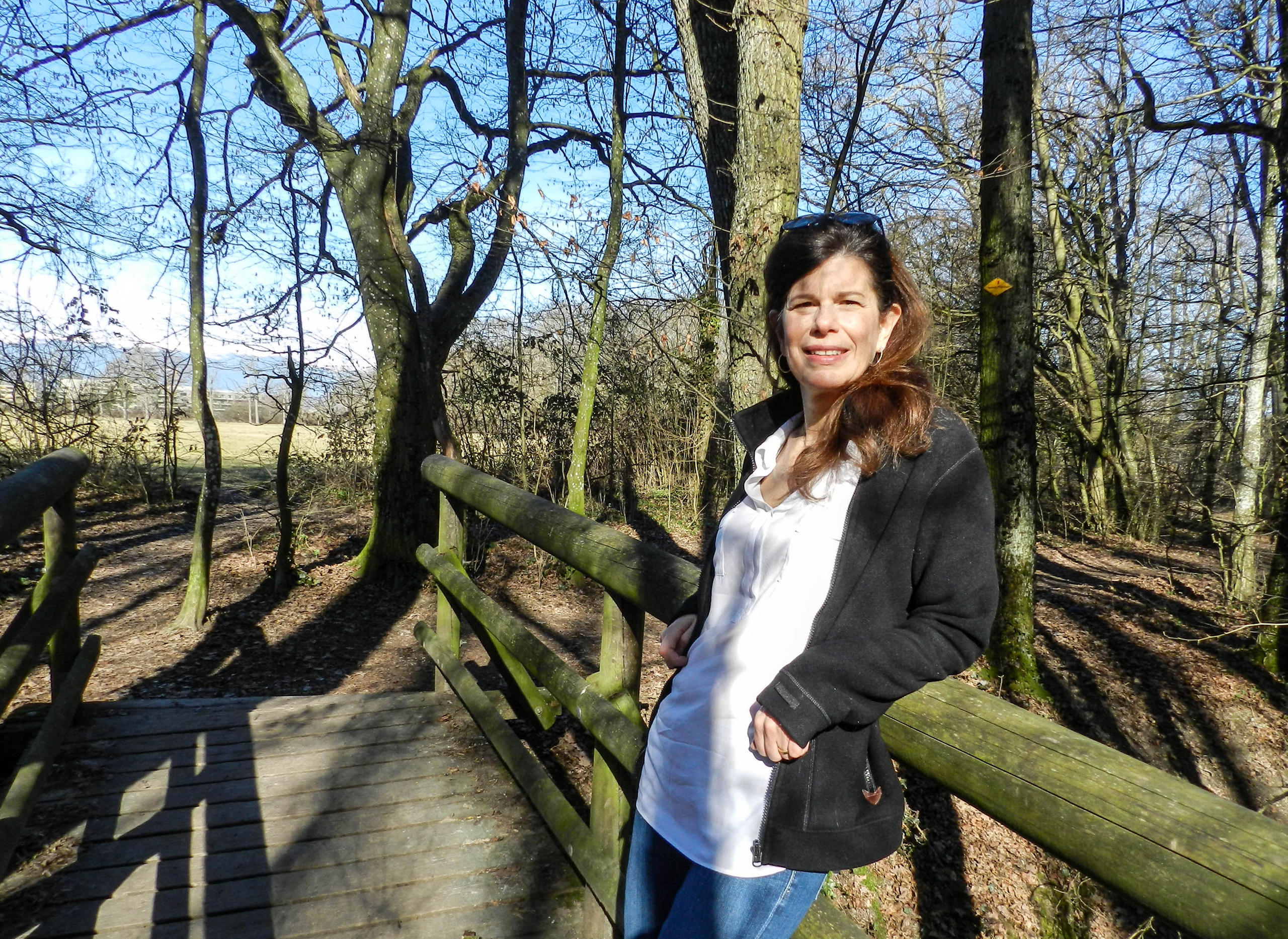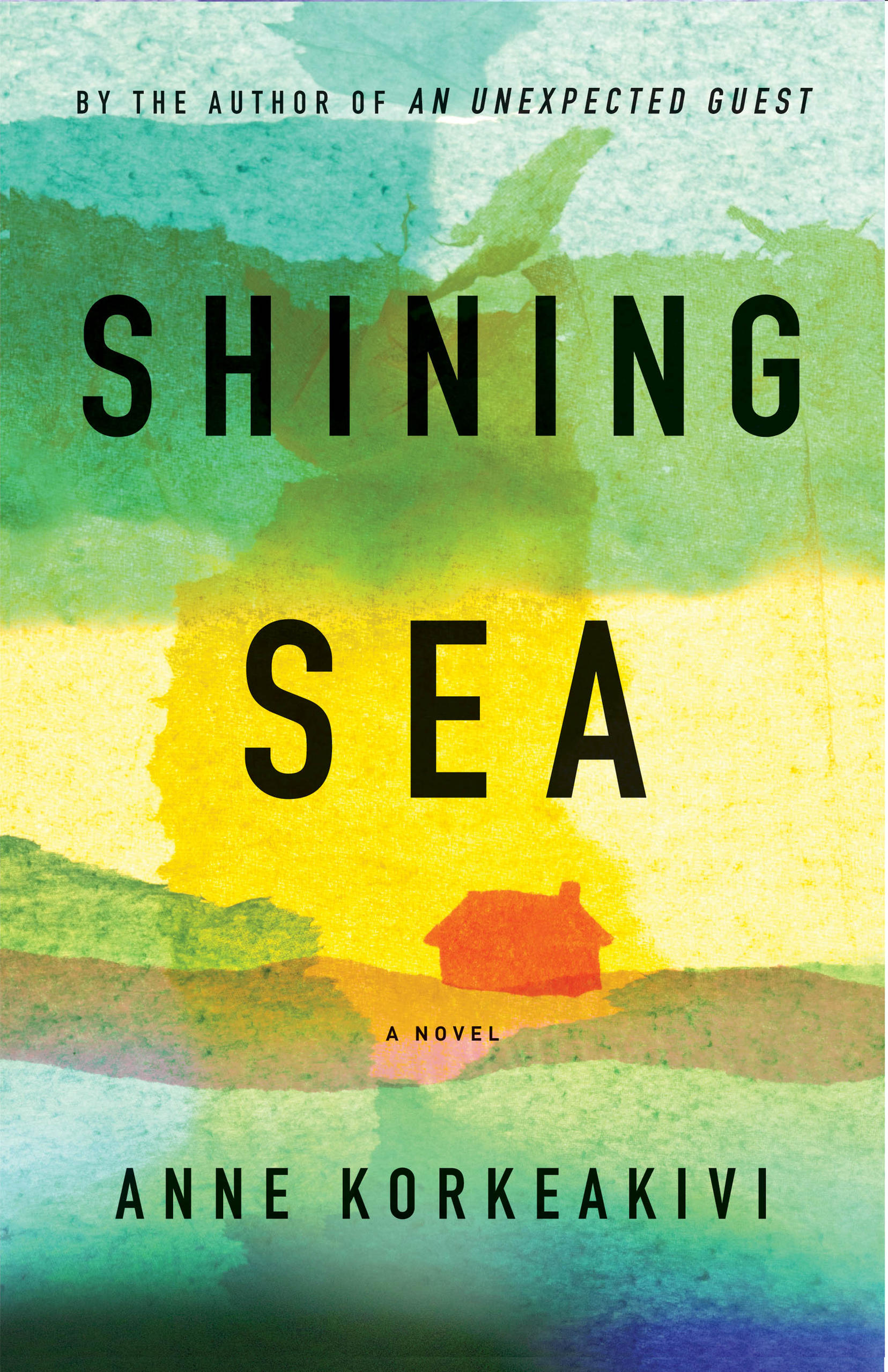
Writer of the world in an international city

As much at home in the outdoors as in the city, American author Anne Korkeakivi has found the perfect mix in Geneva. She talks about her two novels and writing life with Clare O’Dea in this third in a series of profiles of English-language writers in Switzerland.
Walking along a Swiss forest trail, within sight of the French border, Korkeakivi is in her element. The writer who has lived abroad for most of her adult life has claimed this little corner of Geneva as her own.
The route twists and turns, creating the illusion of unspoilt woods and waterways, though busy roads, industry and housing are never far away. A five-kilometre loop, this is where Korkeakivi comes to think undisturbed before sitting down to write.
We set off side-by-side, my phone recording our conversation and held out in front of Korkeakivi like an unwanted offering for the duration of the walk.
The author of two novels, Shining Sea and An Unexpected Guest, as well as a significant body of short fiction and nonfiction work, words are Korkeakivi’s craft. She chooses them carefully and with a reflective air when explaining her approach to writing.

“With both of my novels I started with a question that I was mulling over in my head. It’s not that I come to the question with some sort of answer that I want to promote. It’s not that way at all. My writing is an exploration of the question.”
Korkeakivi’s latest novel, Shining Sea, explores how involvement in armed conflict ripples through generations. “This became a more general question about how a historical event affects families and society in general, and how it can tear them apart or bring them together.”
The idea for the novel came after she discovered her father had been carrying his honourable discharge card from his service during the Second World War for more than 60 years.
“He wasn’t carrying it because he needed it for veteran benefits, he was carrying it because it was like an identity card for him in a certain way. It was so important to him,” the New York native explained.
Inspiration
Although none of the events in the novel – a family saga over three generations – are based on personal experience, the inspiration is. “After I found the card, I just couldn’t stop thinking about it. Of course, when I started writing the story it went in all sorts of different directions but that was the core.”
Korkeakivi grew up two blocks from Columbia University in a house that was filled with books. Her parents were former musicians turned businesspeople, with a love for literature. Politics were never far away, with protestors on the streets outside, and the family sitting down to watch Walter Cronkite give the Vietnam War body count every evening.
“I was very little and I don’t think I completely understood it. The only thing I understood was that it was bad and that US involvement was a bad thing. And this was the absolute opposite of my parents who were extremely proud of their war contributions and their loved ones’ contributions a generation earlier. That dichotomy was the spur for the novel.”
Leap of faith
We reach a narrow section of the path that runs along a river and we have to walk in single file. At this stage, one part of my brain is wishing I had worn more sensible shoes. The writing part of my brain is interested to know how Korkeakivi alternates between fiction and nonfiction writing, as this is something we have in common.
For many years a journalist, Korkeakivi’s short fiction and nonfiction work has been published by The Atlantic, The New York Times, the Wall Street Journal and Time Magazine, among others. Making the transition to becoming a novelist required a leap of faith.
“I had always been writing fiction but not in a focused manner. About 10 years ago, there came a point where I decided, OK, now I need to make a decision about where I want to go and really focus on learning to write fiction.”
Korkeakivi was living in Strasbourg, France at the time. She took a hiatus from writing nonfiction and accepted a job working as a freelance editor for the Paris publishing house Flammarion. She decided to give herself one year and see what she could achieve.
“In the eleventh month, I sold my first story.” That was the encouragement Korkeakivi needed. She carried on writing and placing short stories, and started work on her first novel, An Unexpected Guest, the story of a woman married to a diplomat in Paris and harbouring a damaging secret.
Skills from her journalistic career have been helpful to Korkeakivi in her fiction. “There are many skills that translate from one to the other that are very useful. I don’t experience writer’s block, for instance, because you don’t really get away with that. You have a lot of self-discipline.”
“Knowing how to research came in handy also but I had to figure out a different voice altogether that would be a fiction voice. Now I feel pretty much in control of those two voices so I’m back to writing both fiction and occasionally nonfiction.”
Immersion
Korkeakivi puts great effort into research. In the opening chapter of Shining Sea, a former prisoner of war looks back on his life as he faces death. “In order to write it effectively I had to know everything about each of those periods of time that he was travelling through in his mind.”
That included scenes that took place on the Bataan death march in the Philippines. “Since the whole book is largely about how this individual and his loss influence his family, versus the influence of contemporary events, I really had to understand him. And to understand him, I had to understand what he’d been through.”
Because she writes in a very immersive way, Korkeakivi can only inhabit one fictional world at a time. “I don’t have a personal separation. I create worlds and I inhabit them, I really believe them, the people in them become very real to me.” She has now stepped into the fictional world of her third novel.
As a writer, Korkeakivi thrives on solitude. But she is also a communicator, drawn to social media. Towards the end of our walk, she notices a birdhouse in an enormous old tree and takes a photo for her Instagram account.
World writer
No stranger to settling in foreign countries, Korkeakivi has lived abroad for most of her adult life, previously in France and Finland. “I think just the fact that I am an expat writer affects my work. It’s given me a different understanding of the world.”
“Geneva itself is a very multicultural city and that introduces you in this beautiful way to different ways of thinking and different ways of living. That is not necessarily reflected in the material of my fiction but in my understanding of the world, which is what forms my fiction.”
When it comes to promoting her novels, the author returns to the US for book tours, and she retains close connections to her country of origin, but she sees herself more as a writer of the world now than as an American, or Swiss or European writer. This global spirit is evident in the many different locations she features in her work – from Paris to the Philippines to the Hebrides.
After our trek around the woods and back roads of Geneva, it is also evident in Korkeakivi’s appreciation of her current environment. “It gives me joy, and that’s a beautiful thing. I’m a very outdoorsy person as well as being a city person, and in Geneva you have a beautiful mix of those two.”

In compliance with the JTI standards
More: SWI swissinfo.ch certified by the Journalism Trust Initiative


























You can find an overview of ongoing debates with our journalists here . Please join us!
If you want to start a conversation about a topic raised in this article or want to report factual errors, email us at english@swissinfo.ch.